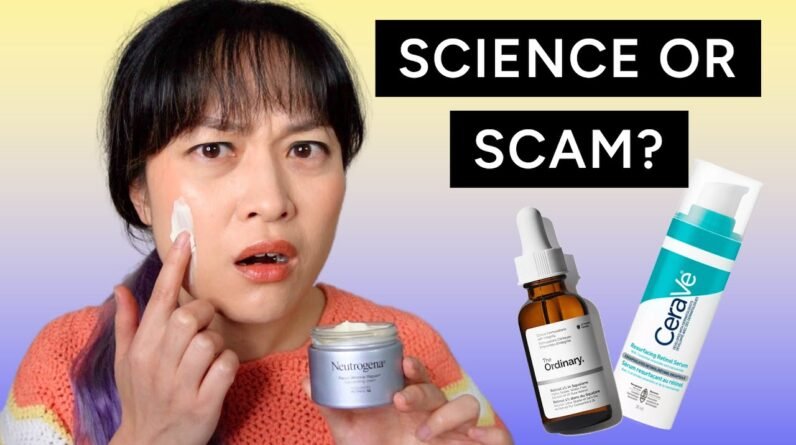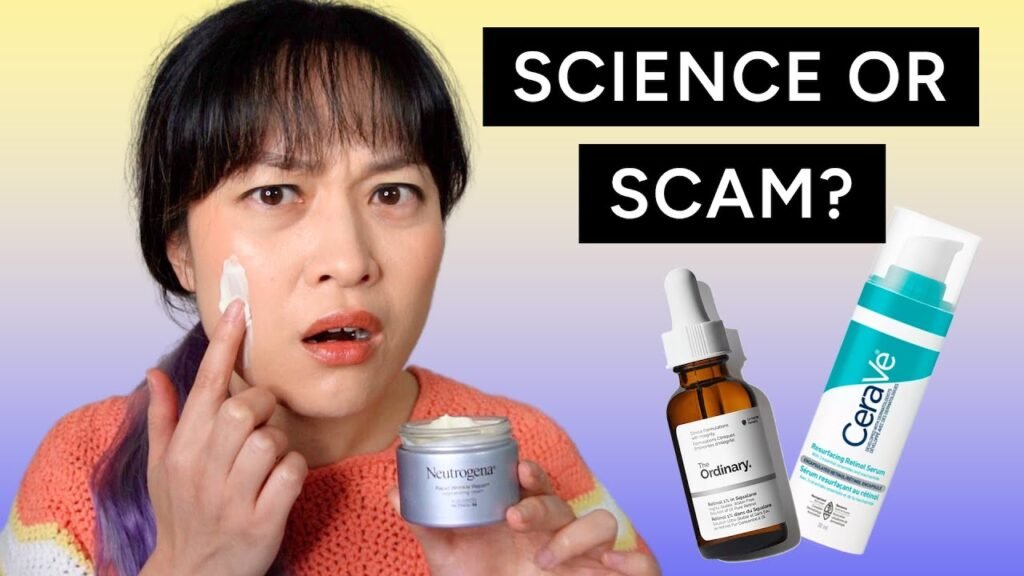
Does retinol in skincare even work? That’s the question on many people’s minds, and it’s no wonder why. While some scientists and dermatologists doubt its effectiveness, retinol is considered a superstar ingredient in the skincare world. The debate stems from the limited trustworthy scientific evidence available to support the use of retinol in improving aged skin. One factor that may contribute to this lack of evidence is the classification of retinol as a cosmetic rather than a drug. Government regulations and definitions of drugs and cosmetics can influence the perception of retinol’s effectiveness. Additionally, research funds tend to be more readily available for studying medical conditions, leading to potential conflicts of interest in skincare studies. Despite these challenges, there is still a significant amount of scientific evidence supporting the efficacy of retinol, albeit with a lack of high-quality clinical trials. The Lab Muffin Matrix is a helpful tool for assessing the effectiveness of skincare products by considering theoretical potential and supporting evidence. In order to make informed choices about skincare, it’s important to check if the active ingredient has been tested on people’s skin, look for clinical studies and biopsy evidence, and verify if the specific product formula has been tested on actual people. Ultimately, a combination of multiple types of evidence and contributions from different scientists can increase confidence in the conclusion. So, does retinol in skincare even work? The answer is yes, but it’s important to approach the topic with a critical eye and consider the available evidence.
Understanding Retinol in Skincare
Defining Retinol
Retinol is a retinoid, which is a type of skincare ingredient derived from vitamin A. It is considered a superstar ingredient in skincare due to its effectiveness in addressing various skin concerns such as acne, hyperpigmentation, and wrinkles.
Importance of Retinol in Skincare
Retinol plays a crucial role in skincare because of its ability to stimulate collagen production, increase cell turnover, and improve skin texture and tone. It has been proven to be effective in improving the appearance of aged skin and addressing common signs of aging.
Scientific Skepticism about Retinol’s Effectiveness
A Lack of Trustworthy Evidence
Some scientists and dermatologists express skepticism about the effectiveness of retinol due to a perceived lack of trustworthy scientific evidence supporting its use. They argue that there is limited clinical data available to support the claims made about retinol’s effects on the skin.
Dermatologists and Scientists Doubts
Dermatologists and scientists who doubt retinol’s effectiveness often base their skepticism on the absence of high-quality clinical trials specifically focused on retinol. They emphasize the importance of rigorous scientific research to establish the efficacy of skincare ingredients and treatments.
Regulatory Impact on Retinol Studies
Classification of Retinol as a Cosmetic
Retinol is classified as a cosmetic by regulatory agencies, which means it is considered a product that primarily changes the appearance of the skin without treating or preventing any medical conditions. This classification may contribute to the perception of retinol’s effectiveness as it suggests that it lacks scientific support.
Government Regulators’ definitions of drugs and cosmetics
The government’s definitions of drugs and cosmetics play a significant role in shaping the perception of retinol’s effectiveness. Drugs are typically subject to extensive testing and approval processes, while cosmetics are not required to undergo the same level of scrutiny. This disparity can result in a lack of comprehensive clinical trials for retinol and other cosmetic ingredients.

Retinol in Over-The-Counter Products
Exploring Retinol’s Antioxidant Properties
Retinol is often included in over-the-counter skincare products because of its antioxidant properties. Its ability to neutralize free radicals and protect the skin from environmental damage makes it an attractive ingredient for skincare formulations.
Market Availability of Retinol-containing products
Retinol-containing products are widely available in the skincare market. From moisturizers and serums to masks and eye creams, there is a variety of options for consumers looking to incorporate retinol into their skincare routine. Its popularity among skincare enthusiasts and its reputation as an effective anti-aging ingredient contribute to its market availability.
Implications of Corporate Funding on Skin Research
Concerns about Potential Conflicts of Interest
Skin research is often funded by ingredient and skincare companies, raising concerns about potential conflicts of interest. Critics argue that corporate funding may influence research outcomes and prioritize profits over unbiased scientific findings.
Lack of Requirement for Cosmetic Clinical Trials
Unlike drugs, cosmetic products are not required to undergo clinical trials before reaching the market. This lack of mandatory testing can limit the availability of comprehensive scientific evidence supporting the efficacy of retinol and other cosmetic ingredients.
Business Interests and Unpublished Research Findings
Companies may choose not to publish their research findings to protect their competitive advantage in the skincare market. This practice can result in a lack of transparency and hinder the scientific community’s access to valuable data on retinol’s effectiveness.
Differential Motivation for Academic Scientists
Drive for Peer-reviewed Publications
Academic scientists are motivated to publish their research findings in peer-reviewed journals to secure funding and advance their careers. However, clinical trials for cosmetics, including retinol, may be less common due to the high cost and limited return on investment associated with conducting such studies.
Challenges in Funding and Career Progression
Research funds are more readily available for studying medical conditions rather than cosmetic treatments. This discrepancy in funding allocation can discourage scientists from pursuing extensive research on skincare ingredients like retinol.
Assessing Clinical Trials for Cosmetics
High Costs and Limited Returns
Clinical trials for cosmetics, including retinol, can be prohibitively expensive and may not yield significant financial returns for companies. The high cost associated with conducting trials, combined with the often limited market exclusivity for cosmetic products, makes comprehensive studies less common.
Extrapolations from Other Types of Evidence
To compensate for the limited number of clinical trials, scientists may rely on extrapolations from other types of evidence, such as preclinical studies and in vitro experiments, to support their claims about the efficacy of retinol. While these types of evidence provide valuable insights, they may lack the specificity and reliability of clinical trials.
Evidence Supporting Retinol’s Efficacy
Dispelling Notions of Lack of High-quality Clinical Trials
Contrary to popular belief, there is a significant amount of scientific evidence supporting the efficacy of retinol, despite the perceived lack of high-quality clinical trials. Multiple studies have demonstrated the benefits of retinol in improving various skin concerns, including photoaging, hyperpigmentation, and acne.
Understanding The Lab Muffin Matrix
The Lab Muffin Matrix is a tool developed by Michelle Wong, also known as Lab Muffin, to assess the effectiveness of skincare products. It takes into consideration the theoretical potential of an ingredient, supporting evidence from various sources, and real-world testing on people’s skin. This comprehensive approach helps to evaluate the efficacy of retinol and other skincare ingredients.
Guidelines for Applying Retinoid Products
Existing Guidelines and Considerations
Existing guidelines for using retinoid products suggest starting with a lower concentration and gradually increasing it to minimize potential side effects such as dryness and irritation. It is important to follow the instructions provided by skincare professionals and to use sunscreen during the day to protect the skin from increased sensitivity to the sun.
Emphasizing Testing on Real People’s Skin
To determine the effectiveness of retinol-containing products, it is crucial to look for clinical studies and biopsy evidence that demonstrate the positive effects on real people’s skin. This type of evidence provides valuable insights into how retinol works and its actual impact on skin health.
Conclusion
Redefining the Perception on Retinol
Despite the skepticism surrounding retinol’s effectiveness in skincare, the evidence supporting its use is significant. Retinol has shown positive results in numerous studies and has become a staple skincare ingredient for many individuals due to its proven benefits.
The Need for More Rigorous and Transparent Research
To address the concerns raised by skeptics and enhance the trustworthiness of scientific evidence in the skincare industry, there is a need for more rigorous and transparent research. Encouraging comprehensive clinical trials, minimizing conflicts of interest, and promoting collaboration among scientists can contribute to a more evidence-based approach to skincare. By bridging the gap between scientific research and consumer perception, the true potential of retinol and other skincare ingredients can be fully realized.






